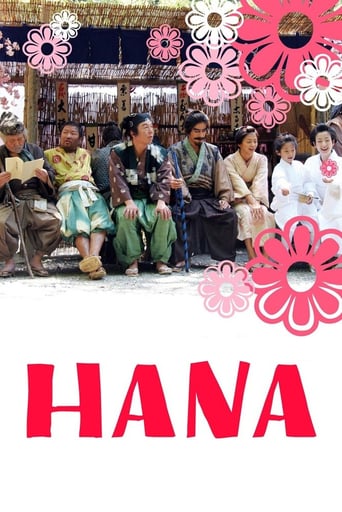poe426
With its caste of row-house poor, HANA reminds one in many ways of Akira Kurosawa's classic, DODESKADEN (Mago, in particular, who brings to mind the young "star" of Kurosawa's movie). Samurai Soza's lack of pretension certainly sets him apart from most of the samurai we see in most samurai movies: he gives it the old bushido try, but, soundly trounced in front of the other row-house denizens, he doesn't suck it up and work toward avenging the insult (nor, ultimately, does he follow through on his avowed mission to avenge his father's death at the hands of another samurai). At first we see him ostensibly looking for a reason to kill; by film's end, he's looking for a reason to live. The final shot of the movie sums it all up so beautifully (and simply). If you're interested in flawless filmmaking, here it is: HANA never misses a beat.
poikkeus
The subtext of this novel, entertaining period film comes from a unique treatment of the famed story of the 47 Ronin (itself the source for history texts, dramas, movies, and plays). Instead of showing the flowering of the Japanese spirit of revenge, HANA YORI MO NAHO takes a more pacifist point of view. In fact, for many of the characters, the main virtue of revenge may lie in its commercial exploitation; for the remainder of the cast - nearly all of them living in a dusty slum on the outskirts of town - revenge breaks apart families, instills instinctual hatred, and only promises generations of promise unrealized.The screenplay is understated and loosely plotted. relying for the most part on light comedy to given texture to its potentially tragic subject matter. The story of the 47 Ronin has been told too often without offering any background on the common people hidden in the background. Sometimes ignoble, it's the people who rise above the violence who seem to have achieved something great - like the failed samurai who ignores his father's dying request to kill a rival. The film's visuals are dusty and dirty, but always arresting,helping to make for a realistic but appealing narrative. All in all, HANA YORI MO NAHO is a much needed corrective on an oft- told story.
screaminmimi
I think the first reviewer misses the point of Kore-Eda's work. He has an almost documentarian's way of showing human behavior. It's decidedly not theatrical. His characters are flawed, real people. Soza-sensei's abhorrence of violence is not undercut by his fear of being sliced up. He discovers the strength to be a real human being amid what he comes to recognize as counterproductive posturing.The 47 Ronin subplot is not a distraction. It's a mirror of Soza's choosing life over revenge. Susumu Terajima hits just the right note as the surviving Ronin. If you don't know Japanese history and myth-making, it might seem like a distraction, but it is the point of the whole story, that a slavish devotion to the ideals of Bushido is in conflict with living an authentically human life.Besides, Rie Miyazawa is a total hoot in the play within a play. It is a pleasant surprise that Kore-Eda can do comedy and still keep it real. I was beginning to think that he was only good at grimness, but I was reminded of the small comic touches in "Nobody Knows" and "Afterlife." I can't remember if there was anything funny in "Mabarosi." I just remember how depressing it was.
kovalsky-1
It's one of those films you come out of smiling a wide happy smile - it's so delicate and subtly funny (alright, it does feature a lavatory, but none of the "standard" toilet humor), it's also kind to characters and makes its point(s) in a sly, unobtrusive manner.It's a celebration of human values over the way of the samurai, especially as it has been presented in Japanese and Western popular culture in the past few decades. A joy to watch visually, too. I thought it might be Koreeda-san's best film so far, although some viewers may find it a bit more conventional/Westernized than, say, Nobody Knows or Maboroshi (which is not at all bad).I will deliberately leave it at that, to avoid revealing any of the plot, which often overturns expectations.It was the second film out of 17 I saw at the Toronto International Film Festival, and it still remains a highlight for me.



